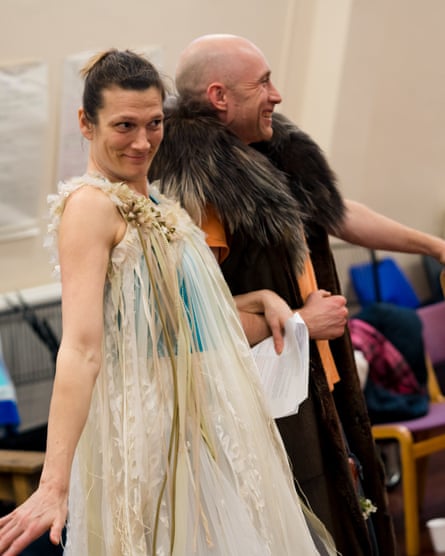The Royal Shakespeare Company has unveiled plans to “level the playing field” for disabled actors by casting them in new productions in what one said marked “another massive crack in the glass ceiling”.
Gregory Doran, the RSC’s artistic director, has picked Karina Jones, who is visually impaired, Charlotte Arrowsmith, who is deaf, and Amy Trigg, who is a wheelchair user, among 27 actors for forthcoming productions of As You Like It, The Taming of the Shrew and Measure for Measure.
Doran told the Observer: “I wanted to really reflect the nation… from the point of view of Hamlet holding the mirror up to nature.” He added: “It’s also about working with the rest of society – not just, as it were, a white middle-class elite.”

Trigg, who was born with spina bifida, said: “Many theatre companies have been championing diverse work, including that of brilliant deaf and disabled artists, for years. But having a high-profile theatre company like the RSC welcome deaf and disabled artists feels like another massive crack in the glass ceiling. This will hopefully encourage other theatre companies, as well as the TV and film industry, to take more steps towards being truly diverse.”
Trigg will play Biondella (a feminised Biondello) in The Taming of the Shrew and Juliet in Measure for Measure. “Biondella is a servant and Juliet is pregnant, so I’m pretty thrilled that you’ll see a working disabled woman on stage in one play and a pregnant disabled woman in another,” she said.
The question of non-disabled actors playing disabled roles resurfaced earlier this month when Breaking Bad star Bryan Cranston defended playing a quadriplegic in the new comedy-drama, The Upside. It continued when the British actress Jameela Jamil revealed she had turned down a role as a deaf woman because she did not want to “be too greedy” and deprive a disabled actor of work.
The stories have emerged amid wider discussions over minority representation in acting, with the film industry criticised for casting straight actors in LGBT roles. But Doran said that the craft was ultimately about acting: “I don’t want to get to the point where we only cast Scottish murderers as Macbeth, Danish princes as Hamlet and morbidly obese alcoholics as Falstaff...
“You can say, ‘well, Richard III, there’s a disabled part’, but… how far do you go? Are you only [going] to cast actors with idiopathic scoliosis, which is what Richard III apparently had? It’s important that there are opportunities across the board.”
He added: “That’s the real challenge. I think actors should be able to play anything. Work needs to be done, so it’s a level playing field.”

Jones said: “Finally theatre is becoming representative of society – 20% [of] people are disabled in the UK. There are people of different classes and ethnicities who should all be represented on stage if it is to be truly reflective of society.”
Jones became disabled aged 13 through a degenerative sight condition. But she went on to study acting at university, got an MA in Voice Studies from the Central School, and underwent intensive training for circus and aerial work at Circus Centre London. With the RSC, her parts will include the vicar – Madame Olivia Martext, feminised from the original Sir Oliver Martext – in As You Like It.
Doran was inspired by Arrowsmith’s acting when she auditioned last year to play the prophet Cassandra in Troilus and Cressida. He sensed her potential to play a character “who’s been blessed with the gift of prophecy by the gods, but cursed in that nobody will believe her”. He added: “What Charlotte brought was a sense of a lifetime of frustration of someone who has tried to make herself understood. That made me just think about casting her again because she’s a terrific actress. She is cast in parts in which her deafness isn’t particular to the character [Audrey in As You Like It and Curtis in The Taming of the Shrew].”
Arrowsmith will sign her lines while another performer may interpret them. They are now rehearsing the plays, “working out the different ways in which it might work”. That includes whether to draw attention to Trigg’s wheelchair. “It’s a learning curve,” Doran said.
As You Like It opens next month. All three productions will premiere in Stratford-upon-Avon before a nationwide tour.
